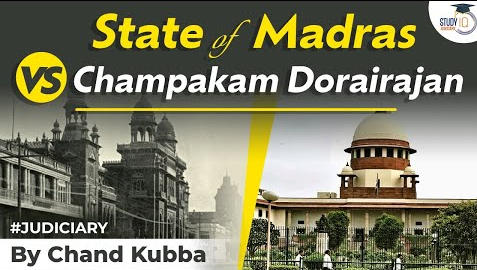Table of Contents
State of Madras v. Champakam Dorairajan
Facts of the Case-
- The State of Madras maintained four Medical Colleges and only 330 seats are available for students in those four Colleges.
- Seats were allotted on the basis of Communal G.O. of 1927, which was continued even after the commencement of the Constitution on January 26, 1950.
- for every 14 seats to be filled by the selection committee, candidates used to be selected strictly on the following basis:-–
- Non-Brahmin (Hindus) … 6
- Backward Hindus … 2
- Brahmins … 2
- Harijans … 2
- Anglo-Indians and Indian Christians …. 1
- Muslims … 1
- Champakam Doratrajan made an application to the High Court at Madras under article 226 of the Constitution for protection of her fundamental rights under article 15 (1) and article 29 (2) of the Constitution.
- Prayed for the issue of a writ of mandamus restraining the State of from enforcing Communal G.O. by which admissions into the Madras Medical Colleges were sought.
- The High Court by its judgment delivered on July 27, 1950, allowed this application of Srimathi Champakam Dorairajan.
15Prohibition of discrimination on grounds of religion, race, caste, sex or place of birth.—
- (1) The State shall not discriminate against any citizen on grounds only of religion, race, caste, sex, place of birth or any of them.
29 Protection of interests of minorities.—
- (1) Any section of the citizens residing in the territory of India or any part thereof having a distinct language, script or culture of its own shall have the right to conserve the same.
- (2) No citizen shall be denied admission into any educational institution maintained by the State or receiving aid out of State funds on grounds only of religion, race, caste, language or any of them.
- The learned Advocate-General contended that the provisions of this article have to be read along with other articles in the Constitution.
- He urged that article 46 charges the State with promoting with special care the educational and economic interests of the weaker sections of the people, and, in particular, of the Scheduled Castes and the Scheduled Tribes.
- AG pointed out that article 46 finds place in Part IV of the Constitution which lays down DPSPs
- though the provisions contained in that Part are not enforceable by any Court, but theses provisions are fundamental for the governance of the country
- Article 37 makes it obligatory on the part of the State to apply those principles in making laws.
- Hence having regard to the provisions of article 46, the State is entitled to maintain the Communal G.O.
- The communal G.O was strictly based on the concept of caste, religion and race ………this is strictly violation of the fundamental right stated under Article 29 (2) of the Constitution.
- If a citizen who seeks admission into any such educational institution has not the requisite academic qualifications and is denied admission on that ground, he certainly cannot be heard to ,complain of an infraction of his fundamental right under this article.
- But, on the other hand, if he has the academic qualifications but is refused admission only on grounds of religion, race, caste, language or any of them, then there is a clear breach of his fundamental right
- SC Held – We reject the above noted contentions completely.
- The DPSPs, which by article 37 are expressly made unenforceable by a Court, cannot override the provisions found in Part III which are expressly made enforceable under article 32.
- The chapter of Fundamental Rights is sacrosanct and not liable to be abridged by any Legislative or Executive Act.
- The DPSP have to conform to and run as subsidiary to the Chapter of Fundamental Rights.
- In our opinion, that is the correct way in which the provisions found in Parts III and IV have to be understood.
- Nothing in this article shall prevent the State from making, any provision for the reservation of appointments of posts in favour of any backward class of citizens which, in the opinion of the State, is not adequately represented in the services under the State.”
- If the arguments founded on article 46 were sound then clause (4) of article 16 would have been wholly unnecessary and redundant.
- It may well be that the intention of the Constitution was not to introduce at all communal considerations in matters of admission into any educational institution
- The classification in the Communal G.O. proceeds on the basis of religion, race and caste.
- In our view, the classification made in the Communal G.O. is opposed to the Constitution and constitutes a clear violation of the fundamental rights guaranteed to the citizen under article 29(2).
- we are of opinion that the Communal G.O. being inconsistent with the provisions of article 29 (2) in Part III of the Constitution is void under article 13.
- It resulted in the 1st Amendment to the Indian Constitution, which addressed the country’s reservation programme. Clause 4 was added to Article 15 as part of the revision.
- 15(4) Nothing in this article or in clause (2) of article 29 shall prevent the State from making any special provision for the advancement of any socially and educationally backward classes of citizens or for the Scheduled Castes and the Scheduled Tribes.
Download | Free PDF






















 WhatsApp
WhatsApp